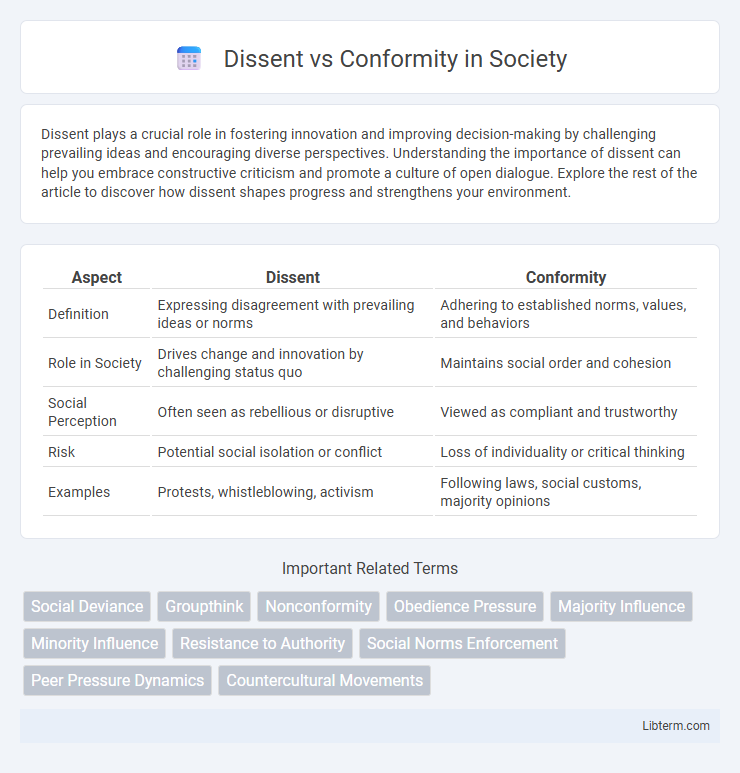Dissent plays a crucial role in fostering innovation and improving decision-making by challenging prevailing ideas and encouraging diverse perspectives. Understanding the importance of dissent can help you embrace constructive criticism and promote a culture of open dialogue. Explore the rest of the article to discover how dissent shapes progress and strengthens your environment.
Table of Comparison
| Aspect | Dissent | Conformity |
|---|---|---|
| Definition | Expressing disagreement with prevailing ideas or norms | Adhering to established norms, values, and behaviors |
| Role in Society | Drives change and innovation by challenging status quo | Maintains social order and cohesion |
| Social Perception | Often seen as rebellious or disruptive | Viewed as compliant and trustworthy |
| Risk | Potential social isolation or conflict | Loss of individuality or critical thinking |
| Examples | Protests, whistleblowing, activism | Following laws, social customs, majority opinions |
Understanding Dissent: Definition and Importance
Dissent refers to the expression or holding of opinions that differ from prevailing or official views, playing a crucial role in fostering critical thinking and innovation within societies and organizations. Understanding dissent involves recognizing its function as a catalyst for social change, challenging established norms and promoting diverse perspectives that drive progress. Valuing dissent enhances democratic processes and organizational adaptability by encouraging open dialogue and preventing groupthink.
What is Conformity? Key Concepts Explained
Conformity is the act of aligning attitudes, beliefs, and behaviors with group norms, influenced by social pressure and the desire for acceptance. Key concepts include normative conformity, where individuals conform to be liked or accepted, and informational conformity, which occurs when people conform because they believe the group's perspective is accurate. Understanding these distinctions highlights how conformity shapes social dynamics and individual decision-making processes.
Historical Examples of Dissent and Conformity
The American Civil Rights Movement exemplifies dissent through organized protests and civil disobedience challenging racial segregation laws. Conversely, Nazi Germany illustrated extreme conformity, with widespread public compliance enforced by propaganda and authoritarian rule. The Salem Witch Trials demonstrate conformity manifesting in mass hysteria and persecution, while figures like Galileo Galilei represent dissent by challenging prevailing scientific doctrines despite social repercussions.
Psychological Roots: Why Do People Conform?
People conform due to innate psychological needs for social acceptance, belonging, and fear of rejection, which activate neural circuits related to reward and punishment. Social identity theory explains conformity by emphasizing individuals' desire to align with group norms to enhance self-esteem and reduce social uncertainty. Cognitive mechanisms, such as informational social influence, lead people to conform when they believe others possess more accurate information in ambiguous situations.
Benefits of Dissent in Society
Dissent fosters innovation and social progress by challenging prevailing norms and encouraging diverse perspectives. It promotes critical thinking and accountability, preventing groupthink and authoritarian control. Societies that embrace dissent experience greater adaptability and resilience in addressing complex social issues.
Risks and Consequences of Conformity
Conformity poses significant risks, including the suppression of individuality and the perpetuation of errors when group consensus overrides critical thinking. It can lead to groupthink, where the desire for harmony results in irrational or dysfunctional decision-making outcomes. Social pressure to conform may also cause psychological stress, reduced creativity, and ethical compromises.
Dissent in the Workplace: Innovation vs. Compliance
Dissent in the workplace can drive innovation by challenging existing norms and encouraging creative problem-solving, fostering a culture where new ideas flourish. Employees who express dissent often provide critical feedback that helps organizations adapt and improve, avoiding stagnation caused by strict conformity. However, balancing dissent with compliance ensures that innovative ideas align with company goals and regulatory requirements, creating a dynamic yet stable work environment.
Social Pressures: How Groups Influence Behavior
Social pressures significantly impact individual behavior as groups often enforce conformity through explicit rules or implicit norms. Psychological phenomena such as peer pressure, the desire for acceptance, and fear of rejection drive individuals to align with group expectations, suppressing dissenting opinions. Studies in social psychology reveal that conformity increases in larger, cohesive groups, where the cost of deviance is perceived as higher, influencing decisions in contexts ranging from workplace dynamics to political movements.
Balancing Dissent and Conformity in Modern Culture
Balancing dissent and conformity in modern culture involves fostering open dialogue while maintaining social cohesion. Encouraging diverse perspectives stimulates innovation and critical thinking, essential for democratic societies and cultural progress. However, establishing shared norms and values ensures stability and collective identity amid pluralism.
Encouraging Healthy Dissent: Tips for Leaders and Organizations
Leaders and organizations foster innovation by encouraging healthy dissent through open communication channels and psychological safety. Implementing structured brainstorming sessions and anonymous feedback mechanisms allows diverse perspectives to surface without fear of retribution. Promoting a culture that values critical thinking and respectful debate enhances problem-solving capabilities and drives organizational growth.
Dissent Infographic

 libterm.com
libterm.com